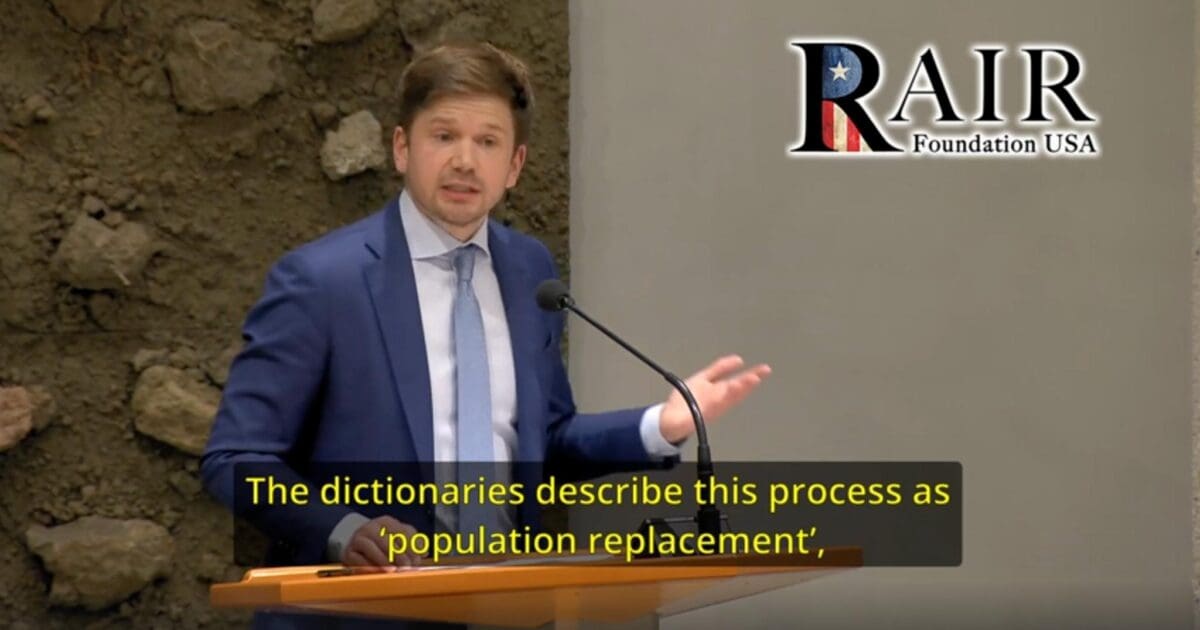During the Asylum and Migration Budget Debate for 2025, Forum for Democracy (FvD) MP Gideon van Meijeren delivered a bold and searing critique of the Netherlands’ immigration policy, exposing its devastating societal and cultural impacts. Central to his speech was his use of the term “population replacement,” a phrase that has sparked intense debate and controversy in the parliament, with prior motions even attempting to ban its use. Undeterred, Meijeren defended the term as a factual description of the demographic shifts caused by mass immigration, refusing to bow to parliamentary censorship.
Meijeren began by acknowledging the humanitarian responsibility to aid those fleeing violence. However, he pivoted sharply to critique the nation’s open-border policies, asserting that uncontrolled immigration over decades had led to disastrous consequences. Citing statistics from the Central Bureau of Statistics (CBS), he highlighted a stark demographic shift: “Since 2000, the population of the Netherlands has grown to more than 2 million people, of whom about 95 percent have a migration background. The population with a Dutch background has been decreasing since then because more people are dying than children are being born.”
He warned of a future where nearly half the population would have migration backgrounds, a trend he described as a “deliberate demographic transformation.” Meijeren cited historical EU proponents, such as Richard Coudenhove-Kalergi—a political theorist and one of the earliest advocates for European integration, who envisioned a unified Europe shaped by mass immigration—and policy architects like Peter Sutherland, a former UN Migration Chief and EU Commissioner often referred to as the “father of globalization.” Meijeren accused them of advancing a globalist agenda aimed at undermining national homogeneity. “Peter Sutherland, a former UN Migration Chief, said in 2012, literally, that immigration should be demanded to undermine the homogeneity of European countries,” Meijeren asserted, further emphasizing the deliberate nature of these policies. Coudenhove-Kalergi described in his work Practical Idealism that mass immigration from Africa and the Middle East would lead to a mixture resulting in a ‘Euro-Asian-Negroid race.’
In his speech, Meijeren also highlighted the systemic failure of the current approach to immigration policy. He criticized the lack of accountability and transparency in the decision-making process, arguing that such failures further alienate the Dutch population and deepen their mistrust in governmental institutions. “People feel unheard and abandoned by the very systems that should protect their interests,” he said, emphasizing the growing disconnect between citizens and policymakers.
Censorship Sparks Defiance
Meijeren’s reference to “population replacement” prompted immediate objections from other parliamentarians, citing a prior motion condemning the term as propaganda. Meijeren responded: “It cannot be that a parliamentary majority decides by motion what a minority cannot say. This undermines our democratic system of equal representation.”
Meijeren outlined a series of practical reforms, including abolishing international treaties like the UN Refugee Convention and implementing permanent border controls. He also called for the Netherlands to reclaim sovereignty by leaving the EU entirely. “Only then can we define our asylum policy and decide who to let into our country,” he asserted. Meijeren emphasized that without these structural changes, any temporary measures would merely “treat symptoms without addressing the underlying problem.” […]
— Read More: rairfoundation.com
What Would You Do If Pharmacies Couldn’t Provide You With Crucial Medications or Antibiotics?
The medication supply chain from China and India is more fragile than ever since Covid. The US is not equipped to handle our pharmaceutical needs. We’ve already seen shortages with antibiotics and other medications in recent months and pharmaceutical challenges are becoming more frequent today.
Our partners at Jase Medical offer a simple solution for Americans to be prepared in case things go south. Their “Jase Case” gives Americans emergency antibiotics they can store away while their “Jase Daily” offers a wide array of prescription drugs to treat the ailments most common to Americans.
They do this through a process that embraces medical freedom. Their secure online form allows board-certified physicians to prescribe the needed drugs. They are then delivered directly to the customer from their pharmacy network. The physicians are available to answer treatment related questions.


